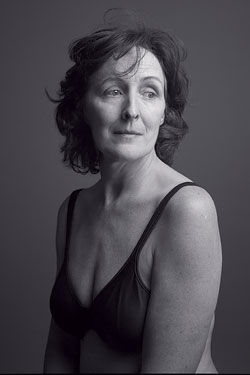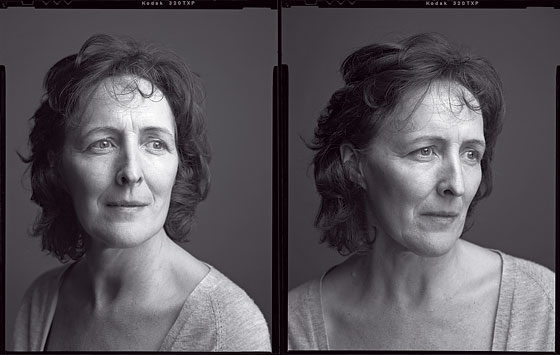
Fiona Shaw feels bad about her neck. Since last January, she has spent 100 minutes a night buried in rubble, first up to her waist and then her neck, as she plays the chatty optimist Winnie in Samuel Beckett’s Happy Days, one of the most demanding female roles in the repertoire. Sharing the stage with her mostly silent husband Willie, Winnie speaks fragmented lines and interacts with a meager bag of props: brushing her teeth, unfurling her umbrella, kissing her revolver. “With Happy Days, you put your head into a noose,” says Shaw, who brings the play to BAM beginning January 8. “It’s a dangerous play; do not try this at home.”
She never intended to spend a year of her life entombed this way. In fact, she’s never even been a fan of Happy Days. “I’ve always been biased against it, feeling that Winnie is some fifties housewife,” she says. For several years, she and director Deborah Warner—their eleven collaborations include a controversial Richard II with Shaw playing the king and the bloody poolside Medea that left New York agog in 2002—had been hoping to stage Waiting for Godot, with Shaw cross-dressing once again. Famously proprietary, the Beckett estate adheres to a strict policy of gender appropriateness: Male roles must be played by men, and female roles by women. Shaw and Warner already knew they were facing an implacable institution. In 1994, the estate shut down their West End production of Footfalls after its first week because Warner cut five lines of text, allowed Shaw to move around the stage, and changed the color of her dress from gray to red. The estate stuck to its gender dictum, and Warner and Shaw decided to tackle the unique challenges of Happy Days instead. (Asked if she still has any hopes of playing Godot in the future, Shaw responds without hesitation: “No, absolutely none. I’ve done my Beckett for a while.”)
The birth of this production looked anything but auspicious. Warner says she was “trepidatious” about the staging, and Shaw felt no immediate kinship with her fellow Irishman: “I’ve never found Beckett very funny. I found it unfunny, in fact.” Discussing her zigzagging path to Happy Days, Shaw takes a philosophical approach. “Often one is backed into something. I didn’t want to do Medea either.” The rehearsal period was grueling. “Learning it first was ghastly,” Warner remembers. “Like stand-up, you can’t really rehearse alone.” Winnie’s forced immobility presented another challenge. “If I’m left with the dirt up to my neck for too long, I do get a bit batty,” says Shaw.
Eventually, Shaw found her way into Beckett’s black humor—through their similar class backgrounds. “My mother was my key in. The comedy has to do with people who live in cities in Ireland, rather than the country. It’s the wit of the privileged, of the city folk.” It’s a rapid urban wit that she is eager to test on New York: “New York audiences are quick verbally—that New York wit you all have that is so quick and wonderful to play to. The audience members charge each other. It’s a privilege to play New York. I’ve performed the play around the world, but it’s mostly been to a lot of Europeans with a lot of surtitles.”
Shaw, 49, had another mental block on playing the role—“I felt too young to play it.” She finally found a counterintuitive way to get into character as a middle-aged housewife: “I based it on a woman in London who is the most successful publisher. She isn’t Winnie, but she is who Winnie would like to be—this socialite, very beautiful and successful. By taking Winnie into the positive, it places her in the center of a universe that is much larger than just suburban Dublin.” Was this publisher a witting muse? “She was. I told her about it. She came to the play—I think she was shocked. That she has an alter ego buried up to her neck.”
Shaw learned to shed her initial disdain for Winnie. “She is very excited about what is immediate. And so is the audience, waiting to hear what she will say next. She launches into the next thing and can’t remember what came before it. It’s almost like the overstimulated modern mind is being met—that memory is falling away—and we all need to be forgiven for that.” And she considers the audience the play’s third character. “The audience hear Beckett in the play more than the actors do. It is like a very deep gong in the people’s mind. The audience is running the evening, because their eye, their ear, is taking in something desperate. Beckett manages to make it palatable. It is very funny, but also very upsetting. Often we find that half of the audience is laughing, and the other half isn’t. Some people panic at the sight of the woman, it’s so claustrophobic. In one way, it’s an installation piece as much as it is a performance.”

Warner echoes Shaw’s notion of a participatory audience but turns to a different metaphor: “It’s a scripted but, in feel, improvised chat between Winnie and the audience. It has the quality of improvised jazz. Beckett’s taking us to a place almost beyond language. That’s why it’s modern. The silence has to be full and complex and different each time.”
Shaw now finds herself in thrall to the grim beauty of Winnie’s monologue, which she describes as “the aria of the person who is stuck but is not bitter. These are wonderful moments when someone strokes eternity into the moment. I’ve always thought Beckett is the very end of modern writing. There’s no God, there’s no romance. And yet there is immense love in it for humanity. He is releasing tenderness on the audience.”
She also faces the irony of hearing her own original skepticism that Winnie is a dull homemaker thrown back at her by critics, the most vicious of whom have declared her Happy Days as tedious as listening to gossip at “the local chipper.”
To such naysayers, Shaw responds with the zeal of a convert. “This is beautifully crafted—it works surprising magic. If I thought it were only the jabberings of some housewife, I wouldn’t do it. Art is art. Chat in a queue is chat in a queue.
“Soup is not art.”

BACKSTORY
An acclaimed lead onstage, Fiona Shaw is also a formidable character actress in film. Her credits straddle the high-low divide, from dramatic fare like My Left Foot and Mountains of the Moon to box-office confections like 3 Men and a Little Lady and Super Mario Bros. Since 2001, she has been universally famous as Harry Potter’s harridan aunt Petunia Dursley—the Über-muggle who despises Harry for his magical powers and forces the boy wizard to sleep under the staircase in a cupboard.
Happy Days
Directed by Deborah Warner. BAM. Through February 2.